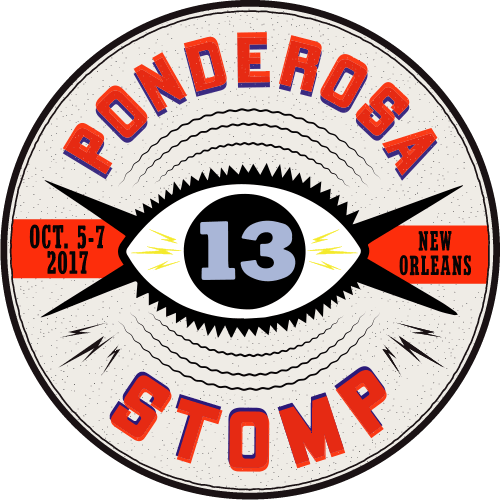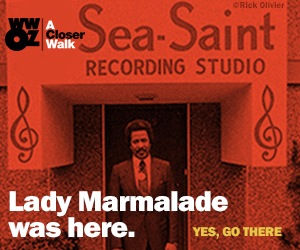Writer Jeff Hannusch profiles CP Love and will interview him at the Mint.
Vocalist C.P. Love might well be best known for a song he didn’t record, rather than one he did. Love had been offered “Groove Me” by King Floyd but passed on the song, feeling Floyd deserved to record it and would do a better job with it. While he could have recorded a major hit, Love still managed to notch a couple of regional successes and assembled a compact, but enjoyable resume of soul and R&B recordings.
Born Carleton Pierre Love in 1945, he was raised on the West Bank of New Orleans. At the age of 12, Love taught himself to play guitar and formed a four-piece band. He later switched to bass when he joined Little Benny and the Creoles, a group that sometimes featured Walter Washington. Originally, Love didn’t sing, but when the vocalist couldn’t learn new material, he began fronting the band on bass and vocals. Eventually, Love dropped the bass and concentrated on singing.
“I liked Sam Cooke, Elmore James, Danny White and Smiley Lewis,” recalled Love in 1999. “That’s what was on the radio. I started going by the Dew Drop and hanging out with Deacon John, Esquerita and Earl King.”
One of Love’s first marquee gigs was sharing the bill with Professor Longhair at Jessie’s Lounge in Marrero.
“I sang some Bobby Mitchell tunes and Fess backed me up,” recalled Love, “The band was just Fess and a drummer. All he had (the drummer) was a bass drum, snare and one cymbal. But when he played he sounded like two drummers. In the middle of the set a guy came in with a shovel and hit two guys over the head with it over a woman. All hell broke loose. Me and Fess grabbed his (electric) piano and carried it outside. He was driving an old limousine with the seats taken out of the back. We just slide the piano in and sat in the front seats. After the fight Jessie (the owner), came outside and asked us to start playing again. Fess said, ‘No, we’re going home.’ He was a quite guy and didn’t go for no humbug.”
In the mid-1960s, Love joined the Invaders, a band that played local club and Tulane’s frat row. One evening, Elijah Walker, a longshoreman turned music entrepreneur, caught the Invaders and liked what he heard.
“Mr. Walker booked dances and shows,” said Love. “He’d bring in whoever had a hot record and put a New Orleans band behind them. One of the bands Mr. Walker hired cancelled a date and he hired us to take their place. After the show, he asked us if we were interested in making a record with him. Naturally, I said ‘Yes.’ Mr. Walker learned the music business the hard way and he didn’t take any shit.”
Walker and Earl King had started a label, King Walk, and in 1968 had Love record “Plenty of Room For More”/”You Call the Shots” at a Conti Street studio located behind an auto body shop. “You Call the Shots” was penned by King and reminded listeners of Wilson Pickett. It did well in New Orleans and lead Love to another recording project. Walker brokered a deal with MGM Records to have Love record a “sound alike” album. Back then, it was common to find LPs and 45s in department store containing covers of current hits at a fraction of the price of the original release. Love recorded an album’s worth of covers by Otis Redding, James Brown and Wilson Pickett in Baton Rouge.
King Walk folded so Walker started a new partnership with arranger Wardell Quezergue dubbed Pelican Productions. Then along came King Floyd and “Groove Me.”
“I told Mr. Walker about King,” said Love. “King had just come back from California. He heard I had made a record and he offered me ‘Groove Me.’ I heard the song and immediately knew it had something. But I thought King had a really unique voice and that he should be the one to record it. We made a tape of King doing ‘Groove Me’ and brought it to Mr. Walker. That was the first time I met Wardell. Wardell heard ‘Groove Me’ and he said to Walker, ‘I believe we have something here.'”
In May of 1970, Love was scheduled to record a Joe Broussard song “I Found All These Things,” at Malaco’s Studio in Jackson, Mississippi. Instead, Love suggested to Walker that Floyd should take his place.
“Walker said, ‘Why do you want to look out for him all the time?’ I just thought it was a good song and King should record it. I never gave not recording the song a second thought.”
Later, Love did record the stupendous ballad “I Found All These Things,’ and like “Groove Me,” Atlantic picked it up to distribute. The song sold well locally, and might well have broken in other markets, had a tour with James Carr not fallen through.
But with “Groove Me” in the charts, Floyd returned Love’s favor by inviting him to open his shows. Love spent nine months touring with Floyd, and then several more with Candi Staton and Bobby Womack. By the mid 1970s, Love was back in New Orleans where the recording scene was pretty much stuck in park. Love survived by playing on Bourbon Street at several venues.
“I did Bourbon Street for 10 years,” said Love. ‘At first it was a job I looked forward to. Later it was a job I looked forward to getting away from. I started at the Sho Bar and later worked at La Strada. At La Strada we’d come on at 7:00 and play until 9:00 p.m. Then Frogman Henry would come on and play until 1:15. Then we’d do another set. I did that for two-and-a-half years. My job was to make the cash register ring and I was good at that. But when Bourbon Street went non-union, you had to take a big cut in pay. I couldn’t accept that.”
A change of scenery was in order and in 1986, Love moved to the Bay Area. Love made some good connections and he managed to stay busy working the club and festival circuit between Seattle and San Diego.. He also cut a four-track EP for Carlo Ditta’s Orleans label. Ditta had briefly relocated in California and managed to arrange a session withe ex-Meters Leo Nocentelli and George Porter. While many listeners were pleased with the effort, Love felt he was rushed and the results could have been better.
In 1999, Love returned to New Orleans to help take care of his ailing mother. Ironically, in 2003, Johnnie Taylor posthumously had a mild radio hit with his cover of “I Found All These Things.” Love continues to perform occasionally around New Orleans.
Jeff Hannusch





